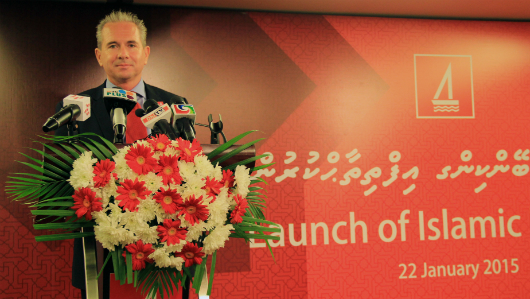With additional reporting by Mohamed Said Fathih and Ismail Humaam Hamid
The Bank of Maldives (BML) has introduced Islamic Banking Services today (January 22).
The service inaugurated by Minister of Islamic Affairs Dr Mohamed Shaheem Ali Saeed will be operated under the name ‘BML Islamic’ which will offer its personal and business customers with deposit and financing products.
“This is a big and proud day for our Bank,” said BML’s CEO and Managing Director Andrew Healy. “Today we start to provide alternatives to those who wish to strictly follow Islamic principles in their banking.”
“We look forward to rolling out a broad range of products and services – for both personal and business customers – over the next two years”.
Islamic banking and capital market services – compliant with Islamic Shariah – were introduced in the Maldives in 2011, with the opening of the Maldives Islamic Bank.
The Capital Market Development Authority began reporting on the Islamic Capital Market for the first time last year, while Maldives Monetary Authority Governor Dr Azeema Adam said that the industry’s potential was still being realised.
“One of the reasons for the phenomenal growth of Islamic finance is the perception that it is more ethical, compared to conventional finance, which is traditionally viewed as predatory when needed,” Azeema told the Maldives’ first Islamic banking conference last September.

The new BML service will be provided by existing branches of the bank but Islamic bank accounts and finances will be “fully segregated from the rest of the Bank’s Services”, explained a BML press release.
“ATMs and card machines and will be fully Shari’ah-compliant, with Islamic accounts,” the statement continued, while Wadi’ah accounts can now be opened at any BML branch.
Prominent Islamic scholars have expressed their support for the move, with Dr Aishath Muneeza, Sheikh Fayyaz Ali Manik, and former Islamic minister Dr Abdul Majeed Abdul Bari all contributing to BML’s promotional campaign.
“I believe this is a service which has been much needed for the people of Maldives. This allow lot of people across the country to go about their financial transactions as per Islamic Sharia,” said Sheikh Fayyaz.
Islamic minister Shaheem today described the move as “great news for many Maldivians”, saying that “BML’s commencement of Islamic financial services, to coincide with the day Maldives embraced Islam, is a memorable occasion”.
Other recent changes to services provided by the national bank included 22 state-of-the-art ATMs across Malé in November as well as the bank’s first US dollar ATM at its main branch the following month.
Related to this story
Potential of Islamic finance yet to be fully explored in Maldives, suggests MMA governor
Maldives “ideally placed” to be international financial centre, says CMDA chief